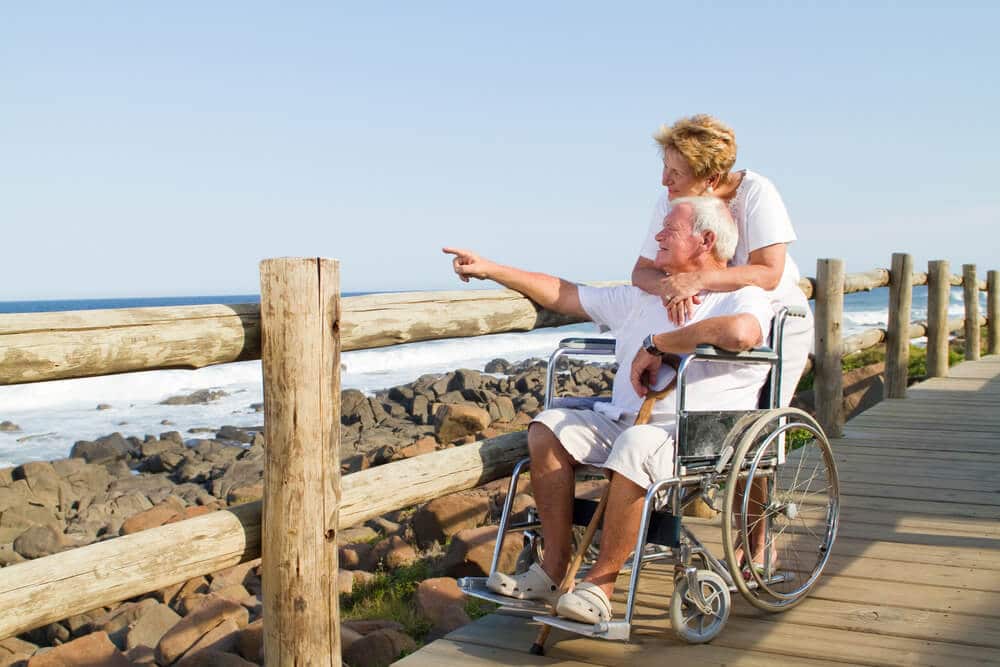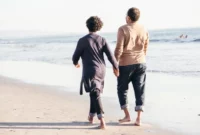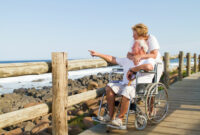Vacations for seniors with limited mobility needn’t be confined to dreams. This guide explores accessible travel options, ensuring a relaxing and enjoyable experience for older adults who may have mobility challenges. We’ll delve into finding the perfect accessible destinations, accommodations tailored to specific needs, engaging activities that cater to varying physical capabilities, and essential travel preparations for a smooth and memorable journey. Planning a vacation should be exciting, not stressful; we aim to make this process easier and more enjoyable.
From researching accessible destinations with easy navigation and convenient transportation to selecting hotels with adaptable features and booking appropriate travel insurance, we will provide comprehensive information to empower seniors and their families to plan memorable and worry-free getaways. We’ll also address potential challenges and offer practical solutions, helping to ensure a safe and fulfilling travel experience for everyone.
Activities and Entertainment
Planning engaging activities for seniors with limited mobility requires careful consideration of their physical capabilities and interests. The goal is to create a vacation that is both stimulating and relaxing, fostering a sense of enjoyment and independence. A well-structured itinerary can make all the difference in ensuring a positive and memorable experience.
Engaging Activities for Seniors with Limited Mobility
The following activities are designed to be adaptable to various levels of mobility and cater to a range of interests. They prioritize comfort and accessibility while offering opportunities for social interaction, mental stimulation, and gentle physical activity.
- Gentle Water Aerobics: Water provides buoyancy, reducing stress on joints. Low-impact exercises like arm movements, leg stretches, and gentle water walking can improve circulation and flexibility. The warm water can also be soothing and therapeutic.
- Guided Nature Tours (Accessible Routes): Many parks and nature reserves offer accessible pathways and transportation options for those with limited mobility. A guided tour allows for a relaxed pace and the opportunity to enjoy the beauty of nature without strenuous exertion. Wheelchair-accessible vans or golf carts can be arranged for transportation.
- Art and Craft Workshops: These workshops provide a stimulating mental activity and opportunities for creative expression. Participants can engage in painting, pottery, or other crafts from a seated position, fostering a sense of accomplishment and relaxation. The social interaction with other participants adds to the enjoyment.
- Interactive Museum Visits: Museums often offer accessible entrances, ramps, and elevators. Many museums now also provide audio guides and tactile exhibits, making them more inclusive for visitors with disabilities. Choosing museums with a focus on subjects of interest to the seniors will enhance the experience.
- Relaxation and Wellness Sessions: These sessions can include chair yoga, gentle massage therapy, or meditation. These activities focus on relaxation and stress reduction, improving overall well-being. The emphasis is on comfort and stress reduction, making them suitable for those with limited mobility.
Sample Seven-Day Vacation Itinerary
This itinerary balances engaging activities with ample time for rest and relaxation. Adjustments can be made based on individual needs and preferences.
| Day | Activity | Notes |
|---|---|---|
| Day 1 | Arrival and Relaxation | Settle into accommodations, gentle walk around the hotel grounds. |
| Day 2 | Gentle Water Aerobics | 30-minute session followed by rest and light refreshments. |
| Day 3 | Guided Nature Tour (Accessible Route) | Focus on scenic overlooks and easy walking paths. Use of a wheelchair-accessible van. |
| Day 4 | Rest and Relaxation | Free time for personal activities, reading, or socializing. |
| Day 5 | Art and Craft Workshop | Two-hour session, seated activities. |
| Day 6 | Interactive Museum Visit | Focus on exhibits of interest; utilize audio guides and accessible facilities. |
| Day 7 | Relaxation and Wellness Session (Chair Yoga) | Followed by departure preparations. |
Potential Challenges and Solutions
Seniors with limited mobility may encounter challenges such as fatigue, discomfort, and difficulty navigating certain environments. Proactive planning and preparation can mitigate these issues.
- Fatigue: Schedule frequent rest periods throughout the day. Avoid over-scheduling activities. Consider pacing activities to match individual energy levels.
- Discomfort: Ensure comfortable seating and accessibility features are available at all venues. Provide access to pain relief medication as needed. Consult with a physician before engaging in any new physical activity.
- Navigation Challenges: Choose accessible accommodations and venues. Arrange for transportation assistance as needed. Utilize assistive devices such as wheelchairs or walkers.
Travel Insurance and Assistance
Planning a vacation requires careful consideration, especially for seniors with limited mobility. Securing the right travel insurance and assistance services is crucial for a safe and enjoyable trip, mitigating potential risks and providing peace of mind. This section details the importance of comprehensive coverage and the various support options available.
Travel insurance specifically designed for seniors with mobility limitations offers vital protection against unforeseen circumstances. Standard policies may not adequately cover the unique needs of this demographic, such as extended hospital stays or specialized medical evacuation. A comprehensive policy should encompass medical emergencies, trip cancellations, and lost or damaged luggage, offering financial protection and reducing the stress associated with unexpected events.
Medical Emergency Coverage
Medical emergencies can be particularly costly and disruptive when traveling, especially for seniors requiring specialized care. Travel insurance should cover emergency medical expenses, including hospitalization, doctor visits, and prescription medications. The policy should clearly define the extent of coverage, including any limitations on the amount reimbursed or specific medical conditions excluded. For example, a policy might cover up to $1 million in medical expenses, including air ambulance transport back home if medically necessary. It’s crucial to review the policy details carefully to understand the scope of medical emergency coverage.
Trip Cancellation and Interruption Coverage
Unexpected events, such as sudden illness or severe weather, can necessitate trip cancellations or interruptions. Travel insurance often covers non-refundable trip costs, including airfare, accommodation, and pre-paid tours, in the event of a covered cancellation reason. This protection helps avoid significant financial losses. For instance, if a senior traveler becomes ill and is unable to travel, the insurance could reimburse the cost of non-refundable flights and hotel bookings. The specific covered reasons for cancellation will vary between policies, so careful review is necessary.
Lost or Damaged Luggage Coverage
Lost or damaged luggage can be particularly distressing, especially for seniors who rely on specific medications or mobility aids packed within their luggage. Travel insurance typically covers the replacement cost of lost or damaged baggage, including the contents. This can alleviate the stress and inconvenience of dealing with lost belongings while traveling. A policy might offer reimbursement for a reasonable amount for replacing essential items like clothing and toiletries, as well as specialized equipment like wheelchairs or walkers. The specific limits on reimbursement should be clearly defined in the policy.
Travel Assistance Services
Beyond insurance coverage, several travel assistance services cater to the needs of seniors with limited mobility. These services can significantly enhance the travel experience and ensure a smoother journey.
Airport Wheelchair Assistance
Many airports offer wheelchair assistance services to help seniors navigate the airport efficiently. These services are usually pre-booked through the airline or airport authority. This assistance ensures a comfortable and stress-free transfer between gates, baggage claim, and transportation to hotels. The service typically involves meeting the passenger at the arrival gate and escorting them to their final destination.
Personal Care Assistance
Some travel agencies and specialized services offer personal care assistance during the trip. This can include help with packing, unpacking, transfers, and other daily tasks. This personalized support ensures seniors feel comfortable and confident throughout their journey. This may involve hiring a personal assistant to accompany the senior traveler, offering assistance with tasks such as medication management, mobility support, and meal preparation.
Comparison of Travel Insurance Providers
While specific policy details and costs vary based on factors such as age, health, and trip duration, a comparison of two hypothetical providers illustrates the range of options available.
Provider A: “Senior Travel Secure”
This provider offers comprehensive coverage for medical emergencies (up to $1 million), trip cancellation (up to $5,000), and lost luggage (up to $1,500). They also offer add-ons for personal care assistance and airport wheelchair assistance. The estimated cost for a 10-day trip for a 70-year-old with limited mobility might be around $250.
Provider B: “Global Traveler Plus”
This provider offers similar coverage but with slightly lower limits for medical emergencies ($750,000), trip cancellation ($3,000), and lost luggage ($1,000). They do not include personal care assistance as a standard feature but offer it as a separate add-on service. The estimated cost for the same trip as above might be around $180.
It’s important to compare multiple providers and policies to find the best fit for individual needs and budget. Reading policy details carefully is essential to ensure complete understanding of coverage limits and exclusions.
Last Point
Planning a vacation should be an exciting prospect, not a daunting task. By carefully considering accessible travel options, suitable accommodations, engaging activities, and necessary preparations, seniors with limited mobility can enjoy enriching travel experiences. This guide serves as a comprehensive resource, empowering individuals to confidently explore the world and create lasting memories, regardless of physical limitations. Remember, the journey is just as important as the destination, and with proper planning, both can be incredibly rewarding.




